Fellowship of the Pathfinders: The Importance of Party Dynamic in Fantasy Adventure
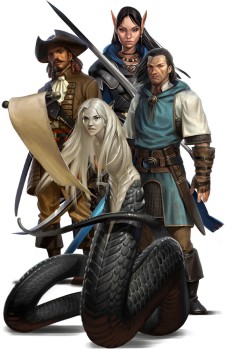
I bought my first Pathfinder novel after reading about it here in a New Treasures post. Howard Andrew Jones’s Stalking the Beast just looked like a lot of fun. Hunting down a big scary monster? Okay, cool. And I’m a sucker for half-orcs. The potential dynamic of a half-elven ranger and a half-orc barbarian working together grabbed me — in fact, I don’t think I ever ran a D&D campaign that didn’t have something like that combination in the mix.
As I described in my review here at Black Gate, I was pleasantly surprised by how much fun the book was — I found myself not wanting to put it down: an experience I was not primed to expect from previous RPG adaptations I’ve read. It delivered the sort of entertainment I am hoping for when I crack open an RPG-themed book, and it was very well written just in general terms as a fantasy novel. Well plotted; good world building; but most importantly, great characters. The dialogue was just as entertaining to read as the action set-pieces.
I subsequently read two of Tim Pratt’s books for Paizo Publishing, and then I went back to Jones’s first contribution to the series. All four of the books impressed me, which left me wondering: is it just because I’m a fan of Jones and Pratt? I mean, these are good writers (a critic more dismissive of “tie-in” literature might have uncharitably suggested they were just “slumming,” writing for a game publisher’s bi-monthly novel line). Were these books the exception, or are Pathfinder novels routinely this level of quality?
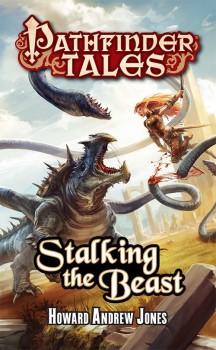 Only one way to find out, right? I decided to do a survey of the books from the beginning. Since a new one comes out every other month, I doubt I’ll ever get to all of them, but I was ready and willing to give other authors in the series a try. I picked up the very first novel in the Pathfinder series, Winter Witch by Elaine Cunningham.
Only one way to find out, right? I decided to do a survey of the books from the beginning. Since a new one comes out every other month, I doubt I’ll ever get to all of them, but I was ready and willing to give other authors in the series a try. I picked up the very first novel in the Pathfinder series, Winter Witch by Elaine Cunningham.
I read the rather longish prologue in three or four sittings. Not a good sign there. I’d read all of Stalking the Beast in as many sittings. The prologue gives a well-written account of a harrowing attack on a Northern village by dire wolves and forces of the night, while a young girl watches over her mother, who is giving birth to a strange, fated child — but I just couldn’t get into it. It didn’t land a hook like those other books, which had me — by three or four pages in — unable to put them down.
In retrospect, I realize that the stumbling block for me was that the prologue was backstory: backstory to characters in whom I was not yet invested — backstory before there was a story to back.
So I set it aside. But one night, when I couldn’t locate another book I was steeped in, I picked Winter Witch back up. And with chapter one, I found that familiar draw working its magic on me. What changed?
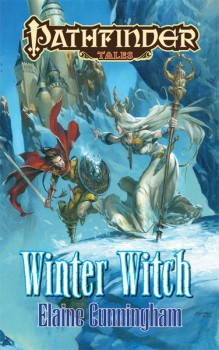 The book had gotten to the story proper, introducing its intriguing cast of characters and quickly setting them up on the path of their adventure. I enjoyed the rest of the ride and was glad I hadn’t set the book aside for good.
The book had gotten to the story proper, introducing its intriguing cast of characters and quickly setting them up on the path of their adventure. I enjoyed the rest of the ride and was glad I hadn’t set the book aside for good.
All of which helped clarify to me something that is probably rather obvious: For a Pathfinder novel — or any book rooted in RPGs, really — to succeed, one must have a group (a fellowship) on a quest. While this may seem self-evident, I have read several books set in RPG fantasy worlds where the author follows a lone character for long stretches, and these I have found nearly always to be unsatisfying. Part of the fun of one of these books — as with the fun and appeal of sitting around a table role-playing with other people — is the interaction of the main characters. Give us some colorful characters and create a heady mix of conflict and comradery within the crucible of the shared quest: fantasy writing 101, I know, but sometimes authors lose sight of that.
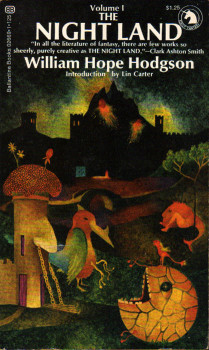 The “fellowship” is integral for this type of book, but the more I think about it, it’s a pretty good thing in general. Casting my memory back over all the books I’ve read, the ones that I’ve most enjoyed have almost always had this dynamic. There are a few exceptions where the book mostly follows a protagonist working alone — indeed, I recently finished James Stoddard’s updatation (a new word I just coined, because it’s not strictly an adaptation but more of an updated version with parts trimmed, the language modernized, and dialogue added) of William Hope Hodgson’s The Night Land, and for almost that whole long book the protagonist is alone. What draws the reader along there is the strange, frightening world that he is alone in; the sheer awe and wonderment of the setting and curiosity about what he will encounter next — but truth be told, when he does finally gain a companion near the end it is like a breath of fresh air let into a bizarrely fascinating room that you have found yourself cooped up in obsessively exploring for far too long.
The “fellowship” is integral for this type of book, but the more I think about it, it’s a pretty good thing in general. Casting my memory back over all the books I’ve read, the ones that I’ve most enjoyed have almost always had this dynamic. There are a few exceptions where the book mostly follows a protagonist working alone — indeed, I recently finished James Stoddard’s updatation (a new word I just coined, because it’s not strictly an adaptation but more of an updated version with parts trimmed, the language modernized, and dialogue added) of William Hope Hodgson’s The Night Land, and for almost that whole long book the protagonist is alone. What draws the reader along there is the strange, frightening world that he is alone in; the sheer awe and wonderment of the setting and curiosity about what he will encounter next — but truth be told, when he does finally gain a companion near the end it is like a breath of fresh air let into a bizarrely fascinating room that you have found yourself cooped up in obsessively exploring for far too long.
Many of the rousing Edgar Rice Burroughs adventures I grew up devouring featured singular protagonists — John Carter of Mars, Tarzan of the Apes — who are introduced and shaped as lone players. Again, though, I do recall that the stories really got interesting when some other characters were brought into the mix and provided companionship in the form of comrades like Tars Tarkas of Thark (and while I was a huge John Carter fan as a boy, I think his adventures on the red planet would have been impoverished without his friendship with Tars Tarkas or his romance with Dejah Thoris).
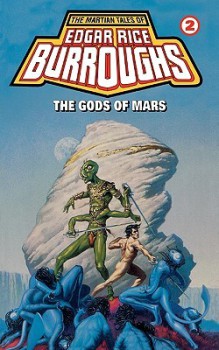 We need society — in our books as well as in life.
We need society — in our books as well as in life.
All right, then, so we crave a good set of characters. Don’t need to attend Clarion or the Iowa Writers’ Workshop to know that, right? But obviously that’s not all one wants. The adventure itself must be suitably challenging, frightening, mind-blowing etc. to give the characters a run for their money. The world in which they live and move and have their being must possess verisimilitude (it should feel like it existed before the characters emerged and will still be there after the characters’ individual stories have drawn to a conclusion), and it should be every bit as interesting as the characters themselves: a setting worthy of them.
A fellowship slap-dashed together can be as much a failure as any other element: just as action can be dull, poorly conceived or written, implausible; so, too, can characters be dull, their personalities shoddily conceived, their dialogue poorly written, their interactions implausible.
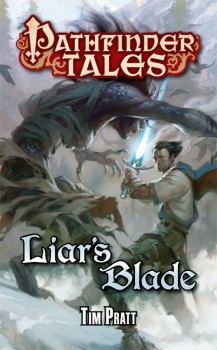 And this is where the stable of Pathfinder writers far more often that not get it right. Howard Andrew Jones’s Stalking the Beast is a rip-roaring tale, but what I really loved most about that book is the friendship between the elven ranger and the half-orc. What’s best about Dave Gross’s installments is the Holmes-Watson dynamic between half-elven Pathfinder/sleuth Varian Jeggare and his devil-blooded servant Radovan Virholt. Which is why I was somewhat disappointed that Gross’s first book separated them for a good bulk of its length. The story really picked up again when Gross brought them back together. (I don’t like it when Holmes stories or adaptations have the characters go “solo” for a while either — one of the pleasures of those stories is how Holmes plays off of Watson and how Watson reacts).
And this is where the stable of Pathfinder writers far more often that not get it right. Howard Andrew Jones’s Stalking the Beast is a rip-roaring tale, but what I really loved most about that book is the friendship between the elven ranger and the half-orc. What’s best about Dave Gross’s installments is the Holmes-Watson dynamic between half-elven Pathfinder/sleuth Varian Jeggare and his devil-blooded servant Radovan Virholt. Which is why I was somewhat disappointed that Gross’s first book separated them for a good bulk of its length. The story really picked up again when Gross brought them back together. (I don’t like it when Holmes stories or adaptations have the characters go “solo” for a while either — one of the pleasures of those stories is how Holmes plays off of Watson and how Watson reacts).
Now that I think of it, the typical hard-boiled detective novel tends to focus on a protagonist working alone, whether it be Raymond Chandler’s Philip Marlowe or John D. MacDonald’s Travis McGee. The lone detective type seems to embody the American sense of individualism. One could overthink it, I guess, and suggest that the hard-boiled private dick is more conservative while the fantasy fellowship is more liberal. In the latter, it takes a village; in the former, it takes pulling oneself up by one’s own bootstraps and pummeling the hell out of the antagonist’s face.
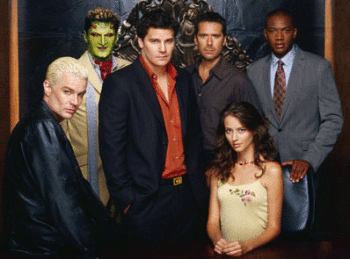 While I love Marlowe and McGee and am an avid reader of their adventures, I’ve always found it fun and full of potential when the hard-boiled detective has been fused into the fantasy genre and gained a retinue (like the Angel TV and comic-book series, or Peter David’s run on the superhero comic X-Factor. Or the TV show Supernatural with its duo of demon-hunting brothers– neither of those characters is particularly interesting to me individually, but their dynamic as brothers is really a case of the whole being greater than the sum of the parts). The introduction of a fellowship to play off and interact with the detective is what makes the aforementioned excursions so entertaining.
While I love Marlowe and McGee and am an avid reader of their adventures, I’ve always found it fun and full of potential when the hard-boiled detective has been fused into the fantasy genre and gained a retinue (like the Angel TV and comic-book series, or Peter David’s run on the superhero comic X-Factor. Or the TV show Supernatural with its duo of demon-hunting brothers– neither of those characters is particularly interesting to me individually, but their dynamic as brothers is really a case of the whole being greater than the sum of the parts). The introduction of a fellowship to play off and interact with the detective is what makes the aforementioned excursions so entertaining.
And back to the Pathfinder books: I must conclude that the master of pulling off the feat I am talking about has to be Tim Pratt. In his stories, the relationship between Rodrik and his smart-alecky talking blade Hrym provides a good deal of entertainment reminiscent of (and in direct homage to) Fritz Leiber’s Fafhrd and the Gray Mouser. But where Pratt truly excels is in adding to the fellowship a character that in many other writers’ hands would be a one-dimensional villain type direct from central casting, but that with Pratt’s masterful handling becomes a rich, compelling, hugely entertaining party member who upstages the main protagonist(s). Whether it be a sneaky, grizzled old rogue or a sorceress in service to a dark lord who has some kind of Cthulhian-type blood in her veins, we — along with the protagonists — can’t help but develop an affection for them. We might not always approve of them or their methods, but it’s the “Tony Soprano” effect: we can’t take our eyes off them. When they are present, they are the most interesting person in the room.
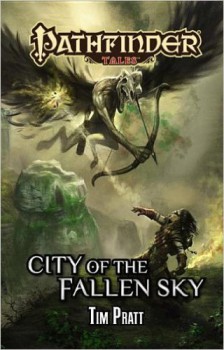 When characters have (1) a good, challenging quest with fascinating obstacles to overcome (hopefully involving some cool monsters) in (2) a well-developed, richly detailed world and are (3) intriguing people whom we want to spend some time with and learn more about who are (4) interacting with other interesting characters with 5) great banter and a balanced mix of cross-purposes conflict and sincere comradery, this is a winning formula. And, the more I think about it, points 4 and 5 may be even more important than the first three. Odds are we will soon forget a lot of the action and the “adventure” part of the adventure, but what we will more likely remember is the relationships: the shared moments that are amusing and the ones that are heartfelt and poignant.
When characters have (1) a good, challenging quest with fascinating obstacles to overcome (hopefully involving some cool monsters) in (2) a well-developed, richly detailed world and are (3) intriguing people whom we want to spend some time with and learn more about who are (4) interacting with other interesting characters with 5) great banter and a balanced mix of cross-purposes conflict and sincere comradery, this is a winning formula. And, the more I think about it, points 4 and 5 may be even more important than the first three. Odds are we will soon forget a lot of the action and the “adventure” part of the adventure, but what we will more likely remember is the relationships: the shared moments that are amusing and the ones that are heartfelt and poignant.
Here’s an example from my own (admittedly not the sharpest) memory: long ago I read a David Eddings series, a typical fantasy quest that sprawled over something like seven volumes. I don’t remember the names of any of the characters (or even the name of the series off the top of my head), and I have forgotten most of the plot. But I remember this. Members of the party were supposed to take turns preparing breakfast each morning, but the member in charge of designating that task didn’t actually have any set rotation. Instead his running ploy was this: he would wait to see who was the first to ask, “So whose turn is it to fix breakfast?” Without batting an eye he would say, “Oh, it happens to be your turn today.” Later in the book the other party members finally got wise to his “system.” They forced him to fix breakfast every morning from that point on. Well, it must have struck me as funny at the time — hell, I remember it two decades on.
I also remember the love and loyalty that a grizzled old veteran knight — the main hero in that series — felt for his liege, a young princess whom he adored (I also recall that when she came of marrying age, that bond developed into something more, and they were wed: a medieval May-December romance).
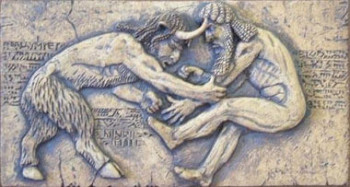
Go back to the oldest fantasy narrative: The Epic of Gilgamesh, which is about 4,100 years old. Without Gilgamesh’s friendship with Enkidu, it would still be a text of interest to historians, obviously. But with that friendship — the first recorded fantasy fellowship — it provides an archetype that still fascinates, influences, entertains, and inspires us to this day.
Anyhow, a good fellowship — a solid party dynamic — is essential to any RPG-based book. The ingredients of a good fellowship make it more likely that we will pass on a book to a friend with the words “Read this. You’ll enjoy it.”
Great post. I’ve been wondering about some of the other Pathfinder novels beyond those of Jones.
deuce,
I’m not finished reading it yet, but I’ll tell you that so far James L. Sutter’s Death’s Heretic has impressed the hell out of me. From about page 2 on I was pretty much convinced I was in the hands of a master storyteller. Premature to say much else before I finish it, but so far that book’s on another level.
Since I know zero about Sutter, writing that comment just prompted me to pause and Google him. Jesus, he’s 31. He was in his 20s when he wrote that novel. I also see he’s one of the co-creators of the Pathfinder Role-Playing Game. So, yeah, he also did that in his twenties. So I guess you can add “prodigy” to the other stuff I said.
He is a gifted writer, with an almost Vancian gift for weird world building, but a greater grasp of character.
He’s also a really nice guy.